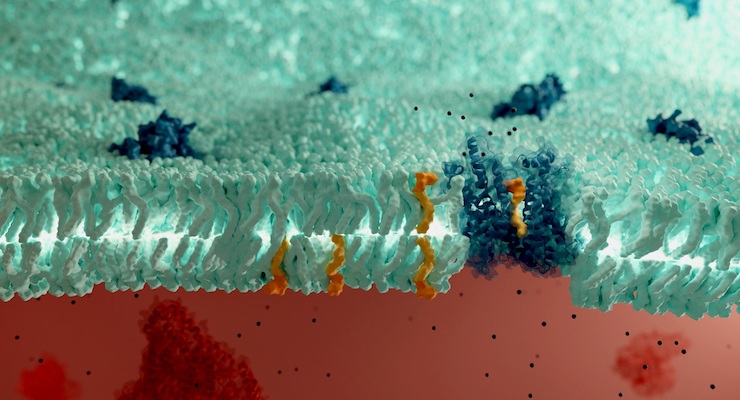12.07.20
Aker BioMarine, a global omega-3s company specializing in krill oil, recently announced that it is seeking research collaborations for lysophosphatidylcholine (LPC)-bound EPA and DHA from krill for a pending new product. The company is looking to investigate the full potential of this unique compound.
Currently, there is no commercially available LPC-bound EPA and DHA on the market, except for high-cost materials, and synthetically-produced versions used for research purposes. The company plans to scale up the production process at its manufacturing plant in Houston, and initiate collaboration with partners to eventually bring LPC from krill to consumers. Aker BioMarine has initiated regulatory processes, and expects to have the approvals to launch a commercial dietary supplement product to the market by the end of 2022.
Brain and Eye Health Benefits
Aker pointed to a breakthrough study, published in the journal Nature, which identified that LPC is a primary carrier molecule of DHA across the blood-brain barrier. This uptake mechanism applies broadly to fatty acids, including EPA and DHA, and is dependent on an LPC transporter protein called Mfsd2A. This transport mechanism is also identified in several organs, including the eyes.
This discovery has led Aker to explore the method to produce LPC-bound EPA/DHA from krill, and the company has produced a new compound, branded as Lysoveta.
With an aging population, and increasing concern around brain and eye health across broadening demographic groups including young people, Aker BioMarine believes that there will be strong demand for a clinically-substantiated brain and eye health ingredient in the years to come. EPA and DHA are both evidenced to be vital to the structure nad function of both the brain and the eyes, in addition to other organs. It is projected by market research company Grand View Research that the market for brain health supplements is expected to grow from $6.7 billion in 2019 to $10.8 billion in 2025, with eye health supplements projected to increase from $1.5 billion to $2.1 billion over the same time period.
Aker BioMarine’s Antarctic krill products are naturally high in phosphatidylcholine (PC), a raw material needed to produce LPC-bound EPA and DHA. Now that Lysoveta has been developed and patent-protected, the company is now focusing on research expansion.
“Our innovation team has spent the last six years working on the science and chemistry with a goal of bringing Lysoveta to market,” Matts Johansen, CEO of Aker BioMarine, said. “With Lysoveta, Aker BioMarine is the first company to produce LPC-bound EPA and DHA from krill. For us, this is a breakthrough in science and produce development, launching a completely new platform to improve human health.”
“The scientific research on the connection between LPC and the targeted delivery of EPA/DHA, combined with our capabilities to produce LPC-bound EPA and DHA from krill at scale, gives us a unique position to be a central player in the development of this completely new product to support brain and eye health,” Dr. Andreas Storsve, director of R&D and Human Products at Aker BioMarine, said. “We will actively seek collaboration with the scientific community and beyond to explore Lysoveta’s full potential and build more knowledge about how it may affect conditions surrounding cognitive and eye health. We are the only company in the world ready to offer a supply of natural raw material to our partners and the research community to continue building our knowledge around LPC.”
Currently, there is no commercially available LPC-bound EPA and DHA on the market, except for high-cost materials, and synthetically-produced versions used for research purposes. The company plans to scale up the production process at its manufacturing plant in Houston, and initiate collaboration with partners to eventually bring LPC from krill to consumers. Aker BioMarine has initiated regulatory processes, and expects to have the approvals to launch a commercial dietary supplement product to the market by the end of 2022.
Brain and Eye Health Benefits
Aker pointed to a breakthrough study, published in the journal Nature, which identified that LPC is a primary carrier molecule of DHA across the blood-brain barrier. This uptake mechanism applies broadly to fatty acids, including EPA and DHA, and is dependent on an LPC transporter protein called Mfsd2A. This transport mechanism is also identified in several organs, including the eyes.
This discovery has led Aker to explore the method to produce LPC-bound EPA/DHA from krill, and the company has produced a new compound, branded as Lysoveta.
With an aging population, and increasing concern around brain and eye health across broadening demographic groups including young people, Aker BioMarine believes that there will be strong demand for a clinically-substantiated brain and eye health ingredient in the years to come. EPA and DHA are both evidenced to be vital to the structure nad function of both the brain and the eyes, in addition to other organs. It is projected by market research company Grand View Research that the market for brain health supplements is expected to grow from $6.7 billion in 2019 to $10.8 billion in 2025, with eye health supplements projected to increase from $1.5 billion to $2.1 billion over the same time period.
Aker BioMarine’s Antarctic krill products are naturally high in phosphatidylcholine (PC), a raw material needed to produce LPC-bound EPA and DHA. Now that Lysoveta has been developed and patent-protected, the company is now focusing on research expansion.
“Our innovation team has spent the last six years working on the science and chemistry with a goal of bringing Lysoveta to market,” Matts Johansen, CEO of Aker BioMarine, said. “With Lysoveta, Aker BioMarine is the first company to produce LPC-bound EPA and DHA from krill. For us, this is a breakthrough in science and produce development, launching a completely new platform to improve human health.”
“The scientific research on the connection between LPC and the targeted delivery of EPA/DHA, combined with our capabilities to produce LPC-bound EPA and DHA from krill at scale, gives us a unique position to be a central player in the development of this completely new product to support brain and eye health,” Dr. Andreas Storsve, director of R&D and Human Products at Aker BioMarine, said. “We will actively seek collaboration with the scientific community and beyond to explore Lysoveta’s full potential and build more knowledge about how it may affect conditions surrounding cognitive and eye health. We are the only company in the world ready to offer a supply of natural raw material to our partners and the research community to continue building our knowledge around LPC.”



























